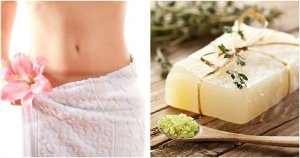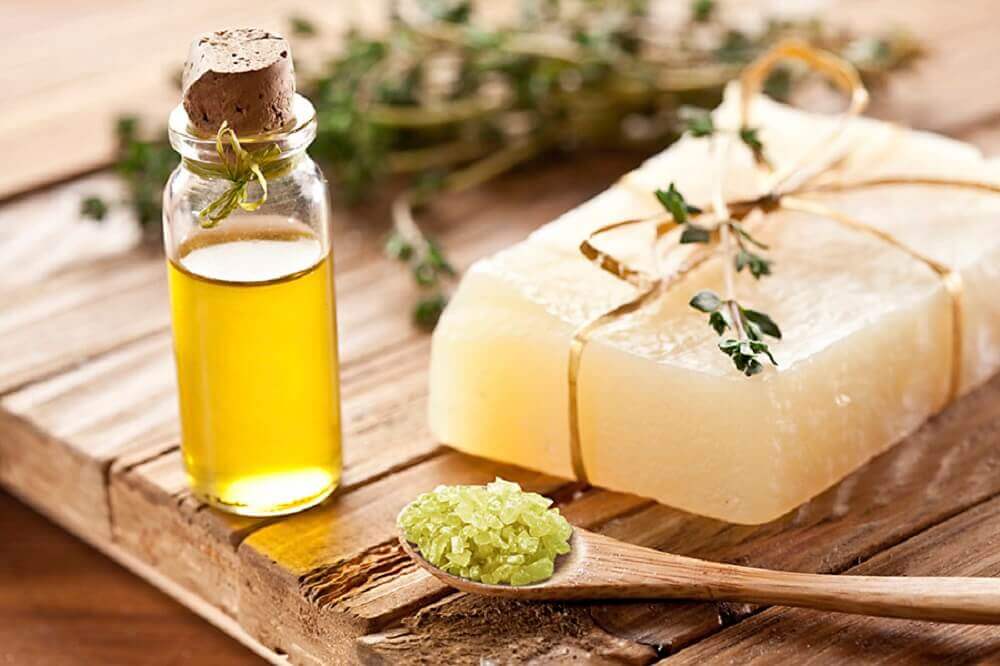How to Make a Natural Soap to Fight Vaginal Infections


Reviewed and approved by the doctor Nelton Abdon Ramos Rojas
The main cause of these infections is the excessive growth of Candida albicans, a microorganism that, despite normally being present in the area, leads to an infection because it inflicts changes in the pH of the vaginal flora.
While the symptoms aren’t serious and may come and go, you should treat them in order to prevent them from lasting longer than they have to or from causing other complications.
Fortunately, in addition to the products available in pharmacies, there are gentle, natural formulas that can help relieve symptoms quickly.
In today’s post, we’d like to teach you how to make a soap for your private area with antibacterial and anti-fungal properties that can help aid in fighting these kinds of problems.
What causes vaginal infections?

Before jumping into the procedure for making the soap, we’ll first go over in detail the factors that lead to vaginal infections.
Candida albicans and other microorganisms are naturally present in the vagina. However, they can lead to an infection because of the humid and warm setting as well as pH changes.
The risk factors include the following:
- Consuming antibiotic medication,
- Being overweight or obese,
- Having diabetes,
- Being pregnant,
- Engaging in sexual relationships without protection,
- Using damp or tightly-fitting clothing,
- Lacking intimate area hygiene habits.
Also read: 7 Natural Remedies to Combat Vaginal Odors
Symptoms of vaginal infections
Vaginal infection symptoms might vary according to the microorganism that causes it (yeast, bacteria or virus).
However, the following symptoms are commonly present:
- Changes in the amount and color of vaginal fluid,
- Foul vaginal odor,
- Irritation and itching in the outer parts of the vagina,
- Painful urination,
- Pain when having sex,
- White and dry spots on the vaginal wall.
How can you make a natural soap to protect your intimate area?

The ingredients that we combine in this natural soap can help balance the pH of the vaginal flora in order to effectively fight against the bacteria and yeast that cause infections.
Unlike commercial soaps, this soap doesn’t contain any aggressive chemicals or compounds that can worsen the itching.
On a further note, its properties relieve the irritation and neutralize the foul odor and heavy fluids.
Ingredients
- 1 glycerin soap base
- ½ cup of organic coconut oil (100 g)
- 1 tablespoon of essential tea tree oil (15 g)
- 2 tablespoons of essential thyme oil (30 g)
Utensils
- Heat-resistant container
- Wooden spoon
- Soap molds
Preparation
- Put the soap base in the heat-resistant container and melt it over a double boiler.
- When it’s completely melted, add the organic coconut oil and essential oils.
- Stir everything together well with the wooden spoon until all the ingredients are combined.
- When finished, take the mixture off the heat at let it sit for a few minutes.
- Before it solidifies, pour it into the mold.
- Leave it to cool at room temperature in a cool place. Remove it from the mold when hardened.
Mode of use
- Use the soap on the external parts of your intimate area when showering.
- Wash with the soap until the symptoms of the infection improve.
Visit this article: Vaginal Itching: 4 Effective Treatments
Additional advice for treating vaginal infections

Regardless of what the cause of your vaginal infection may be, there are some general pieces of advice and ways to help treat it.
- Wear underwear that’s made with breathable and light fabrics such as cotton.
- Eat foods that contain probiotics such as natural yogurt, kefir or kombucha.
- Avoid tight-fitting clothing.
- Put a drop of essential tea tree oil on your underwear to stop bacteria or yeast from growing.
- Drink more water and healthy beverages. Remember that staying hydrated helps keep your intimate area lubricated and protected.
- Avoid having sex until your infection is cured.
- Don’t use powders or fragrances on your vaginal area as they can alter the pH of microbial flora.
Ready to try out this soap at home? We know that you can find plenty of soaps for your intimate health in stores, but the soap in our post has plenty of additional advantages.
Don’t miss out!
All cited sources were thoroughly reviewed by our team to ensure their quality, reliability, currency, and validity. The bibliography of this article was considered reliable and of academic or scientific accuracy.
- Jeanmonod R, Jeanmonod D. Vaginal Candidiasis. [Updated 2020 Nov 21]. In: StatPearls [Internet]. Treasure Island (FL): StatPearls Publishing; 2020 Jan-. Available from: https://www.ncbi.nlm.nih.gov/books/NBK459317/
- Lin TK, Zhong L, Santiago JL. Anti-Inflammatory and Skin Barrier Repair Effects of Topical Application of Some Plant Oils. Int J Mol Sci. 2017;19(1):70. Published 2017 Dec 27. doi:10.3390/ijms19010070
- Crann SE, Cunningham S, Albert A, Money DM, O’Doherty KC. Vaginal health and hygiene practices and product use in Canada: a national cross-sectional survey. BMC Womens Health. 2018;18(1):52. Published 2018 Mar 23. doi:10.1186/s12905-018-0543-y
-
Chen Y, Bruning E, Rubino J, Eder SE. Role of female intimate hygiene in vulvovaginal health: Global hygiene practices and product usage. Womens Health (Lond). 2017 Dec;13(3):58-67. doi: 10.1177/1745505717731011. Epub 2017 Sep 22. PMID: 28934912.
This text is provided for informational purposes only and does not replace consultation with a professional. If in doubt, consult your specialist.








